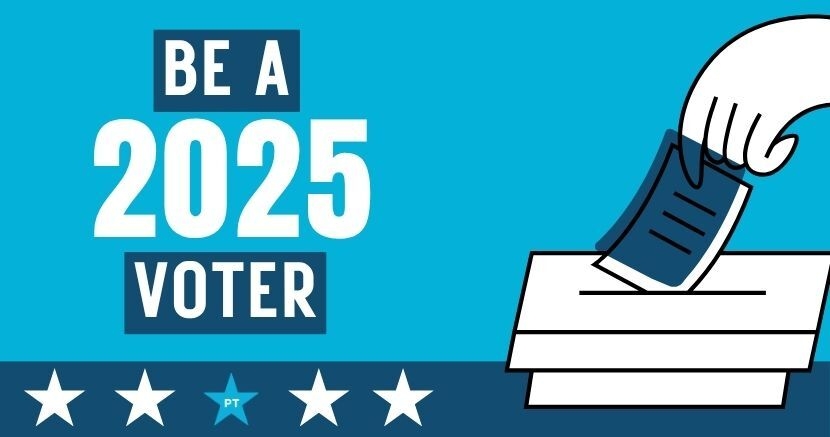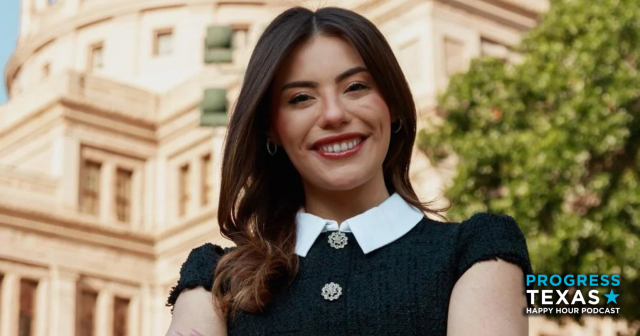Important election deadlines:
- The deadline to register to vote was Monday, Oct. 6
- The early voting period runs from Monday, Oct. 20 to Friday, Oct. 31
- Vote by mail applications are due on Friday, Oct. 24
- Election day is Tuesday, Nov. 4
What’s on the ballot?
If the Texas Constitution had a graded report card, it would read “needs improvement.” Much of this stems from a, you guessed it, post-Reconstruction response to limit governmental powers and citizen involvement. Many of America’s problems stem back to the Civil War and the failure to respond to white supremacist backlash of the Reconstruction Era. This document, our Constitution, that simultaneously holds and protects our most precious rights, is no exception with components that are built strictly to make our government inefficient at delivering public goods. That’s why it’s been amended more than 530 times, and why our legislature is one of less than five states that only meets biannually (instead of every year). It sucks, but we’re stuck with it.
This November, 17 amendments have been proposed by our legislature (under attack for its similar efforts to kick you out of your own government through racial redistricting) to continue in this strong tradition of taking away opportunity for civic engagement. Don’t let them, and learn what’s on the ballot next month ahead of time (totaling to more than $50 billion in property tax cuts). Fund your public services, and fight back by getting informed on what other unsatisfactory things are going to be added to this work-in-progress document.
Here’s our 2025 Texas voter guide to help you navigate the issues and elections on the ballot this year.
Proposition 1 (SJR 59): yes 🏫
Creates an endowment for the Texas State Technical Colleges, used to purchase loans and buildings.
- A “Yes” vote means voting for a TSTC endowment. Would support a skilled workforce and broader career choices in our college system.
- A “No” vote means voting against a TSTC endowment. Does not support dedicating reliable funding to TSTC, to be dedicated elsewhere.
Proposition 2 (SJR 18): no ❌
Prohibits the establishment of a capital gains tax (tax on assets like real estate, investments, and personal property).
- A “Yes” vote means voting for a ban on a capital gains tax. This protects wealthy Texans and potential for state economic growth. Of note: no such tax was considered by the legislature, this would prohibit future action to propose a capital gains tax.
- A “No” vote means voting against a ban on a capital gains tax. A future capital gains tax could shift the tax burden from those more impacted by sales taxes to wealthier Texans.
Proposition 3 (SJR 5): no ❌
Requires the denial of bail for individuals accused of violent offenses punishable as a felony.
- A “Yes” vote means voting to support the denial of bail for high risk individuals. This introduces a financial barrier only put on poorer Texans, as denying bail usually requires a trial, increasing risk of imprisonment to overcrowded jails.
- A “No” vote means voting against additional bail reform. Judges already have tools at their disposal to keep accused individuals under state supervision.
Proposition 4 (HJR 7): yes 🌊
Dedicates the first $1 billion per fiscal year of sales tax revenue exceeding $46.5 billion to the Texas water fund until 2047.
- A “Yes” vote means voting to support funding from sales tax revenue to the Texas water fund. Texas is in a water crisis, facing increased demand and aging infrastructure. Long-term funding would help address these and farmers’ needs, as well as our economic growth.
- A “No” vote means voting against additional revenue for the Texas water fund. This transfers authority to the governor-appointed Texas Water Development Board from the legislature.
Proposition 5 (HJR 99): yes 🐔
Exempts individuals from taxes on animal feed.
- A “Yes” vote means voting for a tax exemption for those selling animal feed. This could help farmers and ranchers, already dealing with rising costs. Animal feed is already tax exempt when harvested or purchased.
- A “No” vote means voting against a tax exemption to sell animal feed. This could benefit large businesses selling feed.
Proposition 6 (HJR 4): no ❌
Bans new taxes on securities transactions, and financial market operators (aimed at those who work in the stock market today, or will work in the Texas Stock Trade).
- A “Yes” vote means voting for a ban on stock trade taxes. This would cement protection for those invested in the market, and for the new Texas Stock Trade (TXSE) in Dallas.
- A “No” vote means voting against a ban on stock trade taxes. This would only impact the most wealthy Texans, and future reforms and regulations could bring forward budget measures to return revenue to working class Texans, who face the brunt of sales and property tax hikes.
Proposition 7 (HJR 133): yes ✅
Provides a property tax exemption for deceased veterans’ spouses.
- A “Yes” vote means voting for tax breaks for veteran widow/widowers. This would provide tax breaks for the un-remarried spouses of veterans who died in the line of duty.
- A “No” vote means voting against tax breaks for veteran widows/widowers. This could reduce property tax revenue, impacting local school districts. Expected to impact 3,000 Texans.
Proposition 8 (HJR 2): no ❌
Bans taxes on estate and inheritance.
- A “Yes” vote means voting for a ban on inheritance taxes. Our state does not have estate taxes, and a ban would prevent future regulations that could level the playing field to shift the tax burden from working families to wealthy Texans.
- A “No” vote means voting against a ban on inheritance taxes. A ban would only benefit a handful of Texans, making others pay higher property taxes.
Proposition 9 (HJR 1): toss up 🤷
Introduces a tax exemption for up to $125,000 worth of business inventory or equipment.
- A “Yes” vote means voting for a tax exemption for business inventory or equipment. This could help relieve small businesses of large financial costs to produce income derived from expensive equipment or inventory.
- A “No” vote means voting against a tax exemption for business inventory or equipment. This tax exemption could be exploited by big businesses, and could reduce income for school districts from property taxes—though the state will pay for that loss with general revenue.
Proposition 10 (SJR 84): yes 🏠
Introduces a temporary tax exemption for homeowners whose properties were destroyed by fire.
- A “Yes” vote means voting for tax breaks for victims of house fires. While most individuals might have home insurance, this exemption could be an extra support.
- A “No” vote means voting against a tax break for house fire victims. This exemption only applies to those whose houses are completely destroyed.
Proposition 11 (SJR 85): yes 👵🏾
Increases school property tax exemptions from $10,000 to $60,000 for elderly and disabled homeowners.
- A “Yes” vote means voting for a tax exemption for elderly and disabled homeowners. The state will pay for losses, and this amendment provides extra support for an expected 2 million homeowners—who are more likely to be in fixed income households.
- A “No” vote means voting against a tax exemption for elderly and disabled homeowners. This would mean school districts have to find funding elsewhere than property taxes derived from these individuals.
Proposition 12 (SJR 27): no ❌
Expands the State Commission on Judicial Conduct (investigates judicial misconduct and reviews termination of judgeships).
- A “Yes” vote means voting for the expansion of the SCJC. This new membership would be outweighed by Governor-appointed citizens, and could politicize the judicial process. While proponents claim this could help promote accountability, critics claim that this could be used against progressive judges.
- A “No” vote means voting against the expansion of the SCJC. Currently, membership includes six judges or justices, two attorneys, and five citizens appointed by different bodies. Voting against this amendment prevents the executive branch from undermining the review of judicial conduct by keeping membership numbers from increasing.
Proposition 13 (SJR 2): yes 🏠
Increases school property tax exemption for all homeowners, from $100,000 to $140,000.
- A “Yes” vote means voting for the increase of homestead exemptions. If this was implemented last year, it would have helped homeowners save $490, on average. The state will pay for losses in revenue for school districts (an estimated $2.7 billion for 2026-2027).
- A “No” vote means voting against the increase of homestead exemptions. This does not benefit renters, and leaves less revenue from property taxes to pay for school districts.
Proposition 14 (SJR 3): yes ✅
Establish the Dementia Prevention and Research Institute of Texas (DPRIT).
- A “Yes” vote means voting to fund (DPRIT). Provides $3 billion in funding for dementia research and prevention to study brain related conditions (dementia, Alzheimer’s, Parkinson’s, etc…) This could establish Texas as a national leader in dementia research.
- A “No” vote means voting against dedicating funding to DPRIT. One might vote against this if they believe medical research should be left to the private sector.
Proposition 15 (SJR 34): no ❌
Codifies “parental rights” language in the Constitution.
- A “Yes” vote means voting to codify parental rights language. This could weaponize the Constitution to propagate right-wing culture wars involving LGBTQ+ families, book bans, and what’s taught in public schools.
- A “No” vote means voting against the codification of parental rights language. Parental rights are already outlined in federal case law, and voting against this language being codified would protect against attacks on LGBTQ+ families, book bans, and what’s taught in our public schools.
Proposition 16 (SJR 37): no ❌
Adds citizenship requirements to the Constitution.
- A “Yes” vote means voting to add citizenship requirements to the Constitution. This is a redundant amendment as U.S. citizenship is already a requirement to register to vote in Texas. This is an inflammatory response aligned with anti-immigration policies and stokes fear about non-citizen voting (an extremely rare phenomenon).
- A “No” vote means voting against additional citizenship requirements in the Constitution. This would protect against the Constitution being wielded to propagate xenophobic rhetoric and policies.
Proposition 17 (HJR 34): no ❌
Provides tax exemption for property involved with border security infrastructure
- A “Yes” vote means voting for border security efforts and exemptions for property around the Texas-Mexico border. This could incentivize support for border security infrastructure, and shift the tax burden onto other property owners. This could be used to bring forward measures to militarize the border.
- A “No” vote means voting against property tax exemptions for border security infrastructure. This amendment could be used to flame xenophobic rhetoric, and bolster support for border security infrastructure.
What’s Next?
- Early voting begins Monday, October 20 and runs through October 31! Prepare to vote using our helpful resource, GoVoteTexas.org! (available in English, Spanish, Vietnamese, Chinese Mandarin, and Hindi)
Here's a printable PDF version of our 2025 Progressive Statewide Ballot Guide!
DONATE
Your donation supports our media and helps us keep it free of ads and paywalls.









